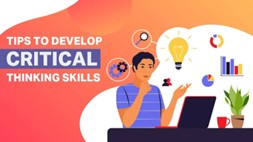In today’s fast-paced and information-heavy world, just having knowledge is not enough. The way of thinking also matters – and that way is critical thinking. In simple words, critical thinking means: thinking before thinking. It means not blindly accepting anything, but analyzing it logically, understanding the reason behind it, and developing your own thinking on that.
When you become a critical thinker, you analyze every problem logically. You can easily make decisions in any situation and are safe from fake news, misleading ads, or manipulation of people. In today’s era where there are distractions and biases everywhere, critical thinking has become like a superpower.
In this article, we will deeply understand how to develop critical thinking – every step logically, with real-life examples.
Question everything – don’t take everything blindly
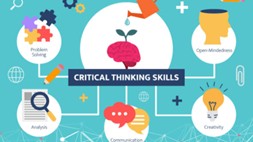
In today’s fast-moving world, information comes from everywhere – news, social media, teachers, friends, influencer Everyone gives their opinions. But if you accept everything without thinking or understanding it, then you become just a follower, not a thinker. The journey of critical thinking begins where you learn to question everything.
Blind Belief vs. Curious Thinking – Understand Difference

Question everything” does not mean that you go to fight with everyone or do the opposite of everything. It means that when someone says something to you, be it your parents, teacher or anybody, you should not just think that if they have said it then it must be right. Rather think, “Is it true? On what basis was it said? “What is the proof of it? Am Does it apply to my situation?
For example, if someone tells you, Taking up Arts does not secure your future, then you need to think, is this true in every case? Have I explored career options in Arts? Are successful people not from the Arts? When you ask questions, only then you are able to make your decisions logically, and not just based on fear or pressure.
This questioning habit sharpens your thinking. You don’t just listen to opinions, you also analyze them. You don’t make assumptions, you look for proofs. You don’t follow blindly, but accept them after understanding. This habit makes you emotionally mature and mentally strong. Take out 5 minutes in your daily routine and think What did I hear today? “What did I blindly believe in?”, “Did I have any doubt about that?” This simple practice will strengthen the roots of your critical thinking.
Observe and Reflect – Pay attention to your thoughts every day
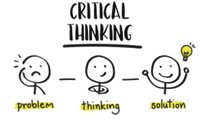
Just observing and understanding the world is not enough, if you never pay attention to what is going on inside your mind. Critical thinking has a powerful tool – self-observation and reflection. Observing your actions, decisions and thoughts every day has to be made a habit. Until you understand your way of thinking, you cannot even improve from it.
Observing yourself is the first step
Imagine you argued with someone and later felt guilty. But at that moment you were reacting emotionally. If you can observe your thought process at that time Why am I speaking in anger? Do I have to prove myself? Is the person in front of you not understanding what I am saying or am I expressing something wrong?” – then perhaps the conflict can be avoided to a great extent.
This is the power of a reflective mindset.
Reflection does not mean just seeing your mistakes, but discovering them. When you take a few minutes out of your daily routine and think – “What did I do right today? What things were overreactions? What decisions did I take without thinking? then you begin to consciously understand your unconscious patterns. This self-awareness is the foundation of critical thinking.
Nowadays we are always distracted – reels, chats, noise. Because of this we are never able to look deeply at our own thoughts. All you have to do is spend 5-10 minutes of quiet time with yourself at the end of the day. Take a pen and notebook and write
What did I observe today?
What did I do impulsively?
What point should I have thought about but I didn’t?
This small exercise makes your mind structured. You rise above emotions and start thinking about logic. Over time, you learn to respond rather than react and this is the mark of a mature, critical thinker.
Learn Different Perspectives – Understand the thinking of others, not just your own
Often we think that what we are thinking is correct. But the real meaning of critical thinking is – to understand the point of view of others, to explore their thinking. As long as you see the world from a single angle, your thinking is limited. But as soon as you step out of your comfort zone and listen to multiple perspectives, then your understanding starts becoming deeper and stronger.
There is a reason for every thought – understand it, don’t judge it
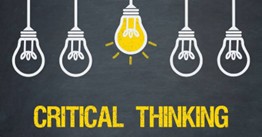
Suppose you strongly believe in a topic – like “there is no future for online education.” But if you talk to a teacher who is educating rural students through the internet, or a working mother who is growing her career by doing an online MBA – then your opinion might change.
This does not mean that you agree with everyone, but that you are open to understanding every angle. When you genuinely listen to the thoughts and experiences of other people, you refine your ideas. Sometimes whatever we consider as “wrong” is just our limited understanding. A critical thinker is one who does not judge but understands with curiosity.
Simple habit can be that whenever you form an opinion on any topic – politics, career, education or relationships – listen to one or two people who have ultra-opposite views on that topic. What is their logic? Is their background different? Are their priorities different? When you consider these things, you are not emotionally biased – you take balanced decisions.
This habit is not for winning a debate. This habit is for you to understand and evolve. Listening to multiple perspectives means opening the doors of your mind – and only when the mind is open, clarity comes.
Balance Logic and Emotion – Learn to think from both, not just the heart or the mind
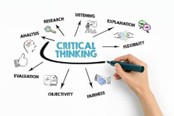
We often either take decisions only from emotions, or else become over-logical where there is no place for emotions. But critical thinking develops only when you learn to balance both extremes. In real life, every decision has both emotions and logic – and if you focus on only one side, then you either become impulsive or insensitive.
Emotion and Logic – Both have their own role
Imagine, a friend of yours asks for money and you are emotionally close to him. Emotion tells you, “Enjoy, money is not considered in friendship.” But logic says, “I gave money last time, it did not come back.” Here, if you give money just out of emotion, you may regret it in the future. If you go by logic alone, the friendship may get ruined. A critical thinker balances both here – he understands his feelings and also thinks about their consequences.
Often students also get emotional while making decisions – like “I don’t like math’s, so I don’t want to take science.” But logic says that “there are many subjects within science in which math’s has less role – like biology.” So if you focus on both simultaneously, then only your decision will be practical as well as personal.
Take another example – when you get angry during an argument, the emotions tell you to react immediately. But logic tells you to “Wait, think, what did the person in front of you say, what misunderstanding could there be?” If you react only with anger, the relationship will be ruined. But if you first pause for 10 seconds and activate logical thinking, you will be able to respond better.
To develop this balance, develop a simple habit – pause before you decide. Whenever a situation arises where a decision has to be taken, stop for a minute. Feel your emotions, understand the reason for it. Then activate your logic – write pros-cons or think. This practice will make you a better thinker in every field – studies, relationships, career.
Practice problem solving daily – learn to handle challenges daily
Critical thinking is not just theory or the practice of thinking – it is a skill that develops through action. And the best form of action is problem solving. Every day we face big and small problems, but if we run away from them or solve them by guessing, we do not develop critical thinking. Solving problems daily builds thinking muscles.
Problem-Solving is Like Gym for Your Mind
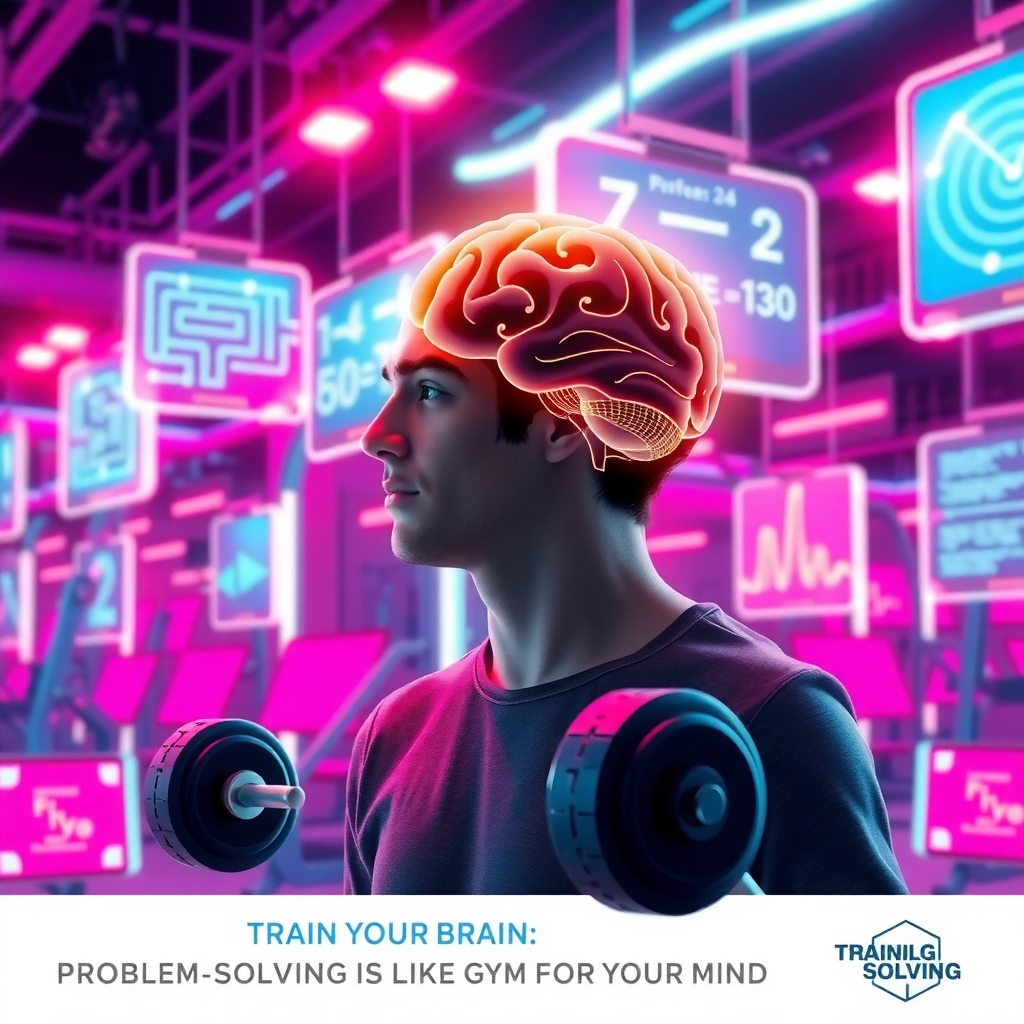
Just as exercising in the gym daily strengthens the body, similarly daily logical thinking and decision-making sharpens the mind. Think about it, if you always have to ask someone else in a difficult situation – “What should I do now?” – then you are not giving your brain a chance to think. But if you start asking yourself:
“What is the root cause of the problem?”
“Do I have any options?”
“Have I ever faced something like this before?”
– then you start becoming a critical thinker.
You should choose a small situation every day – be it time management, studies or relationship. Break that problem – understand the situation, collect facts, write down possible solutions and then think logically what could be the best. This small practice every day makes you a problem solver – and in this world, only those people are successful who know how to solve problems.
If you are a student, try to solve a logic puzzle, Sudoku, reasoning question or case study daily. If you are a working professional, identify a problem in your daily work where you can find a better solution. Critical thinking is not just about thinking, it is about solving. And when you learn to find solutions, only then the world respects your thinking.
Conclusion
Critical thinking is a superpower – and it doesn’t come from some book or quote. It comes from daily conscious practice. When you stop blindly believing, observing, listening to different views, balance emotions with logic, and start solving problems – then you become a real critical thinker.
If you want your decisions to be smarter, life to be clearer and the future to be stronger – then start applying these 5 tips in your daily life from today. With time you will see that your way of thinking is improving drastically.
Q1. What is the simple meaning of critical thinking?
Critical thinking means understanding, analyzing and responding to any situation, information or problem not just at the surface level but at the deep level. In this you do not blindly believe anything, rather you think and see all the angles and decide for yourself what is right and what is not. This skill makes you emotionally balanced and practically strong.
Q2. Is critical thinking taught in school only?
Some level of logical thinking is taught in school – like solving maths problems, reasoning questions, etc. But true critical thinking develops from real-life experiences of life. When you observe, reflect, control your emotions and learn to think with logic – then critical thinking actually develops. This is a lifelong process.
Q3. I overthink everything. Is this critical thinking?
No, there is a lot of difference between overthinking and critical thinking.
In overthinking you create confusion and anxiety by thinking about the same situation again and again.
In critical thinking you analyse the situation in a structured way – understand the facts, look at the pros and cons, and then take a decision calmly. Overthinking tires the mind, while critical thinking gives clarity.
Q4. Is critical thinking only for intelligent people?
Absolutely not! Critical thinking is not the result of any IQ test. It is a habit which every person can develop in his routine. You just have to observe, ask questions, avoid biased decisions and seek to understand the situation calmly. With regular practice every person can become a critical thinker – be it a student, worker or a businessman.
Q5. How can I broaden my thinking?
You can take some powerful steps to broaden your thinking:
Explore different perspectives daily (news, podcasts, conversations).
Stay away from only confirmatory content (what you already believe).
Talk to people with a different culture, career and mindset.
Seek to challenge your beliefs – without getting emotionally hurt.
All of these will make you flexible, open-minded and a deep thinker.

